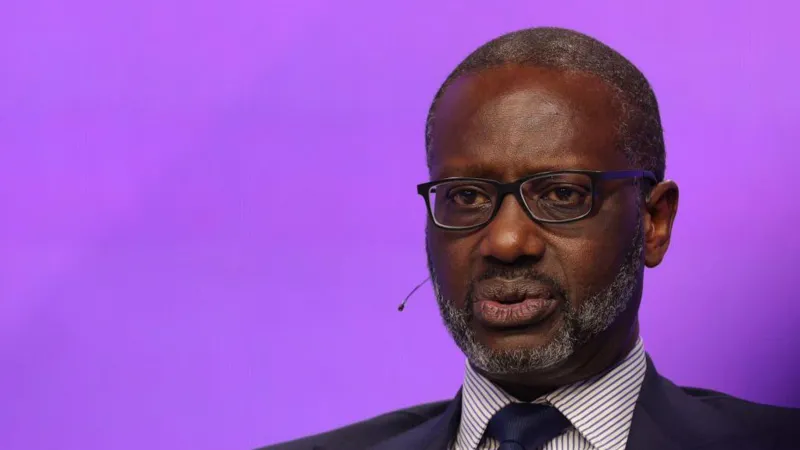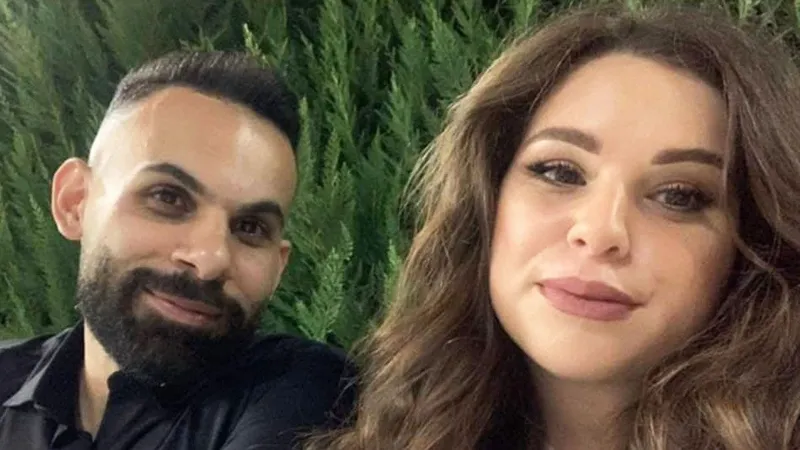'I was born Ivorian' - bank boss barred from running for president tells BBC
Tidjane Thiam, a former international banker and the leader of Ivory Coast's main opposition party, has told the BBC that he will not give up his place on the presidential ballot without a fight.

Last month, an Ivorian court ruled that the former Credit Suisse boss was not eligible to contest the poll, or even vote, because he had forfeited his Ivorian nationality when he acquired French citizenship in 1987.
But this was strongly rejected by Thiam. "The bottom line is, I was born Ivorian," he told the BBC.
The government said that at the time he registered on the electoral roll he was not legally a citizen of Ivory Coast.
In the BBC interview, Thiam suggested that the ruling had been politically motivated.
"It's not for the regime to choose who runs opposition parties. It's not for the regime to eliminate opposition leaders," he said.
"I don't think anybody in the Ivory Coast believes that this is not a weaponisation of the legal system by the government."
This was rejected by Ivory Coast's Information Minister Amadou Coulibaly.
"The court rules that at the time he was registered on that [electoral] list, he was not Ivorian," he told the BBC's Newsday programme on Friday.
"This is clear proof that this gentleman does not know Ivory Coast... We have a problem with morality with Mr Thiam - he knew he was wrong," he added.
Thiam told the BBC: "What's happened is that they dug out a 1961 law that has never been applied to anybody. But in theory, it says that if you take another nationality, you lose your Ivorian citizenship."
"Most of the Ivorian football team is in the same case," he said.
Although Thiam relinquished his French nationality in March to run in the election, the court found that his candidacy was invalid, given that he was not Ivorian when he first registered on the electoral roll.
The 1961 nationality code states that: "An Ivorian national of full age who voluntarily acquires or states that he possesses a foreign nationality shall lose Ivorian nationality."
Thiam is now mounting a legal challenge.
His disqualification came just a week after the centre-right Ivory Coast Democratic Party (PDCI) confirmed him as its presidential candidate.
Outraged members of the party say they are suspending all parliamentary activity in protest at his disqualification.
His supporters are still hopeful he could be readmitted as a candidate.
The final electoral list for October's election is to be published on 20 June.
Thiam was expected to challenge the ruling RHDP party currently led by Alassane Ouattara, who has been in power for 15 years.
Ouattara was previously barred from running for president in the early 2000s on the grounds of nationality because of claims his parents were from Burkina Faso.
Information Minister Coulibaly told the BBC that the nationality law had previously excluded a candidate who had French nationality, in 2011.
"[Thiam] blames the government for a decision taken by the court," he added.
"It's an insult to think that when you're in the West, you can comply with the rules, the laws of those countries, and then you arrive in your own country because you think you have power and connections, you can trample on all the texts, flout all the laws," said Coulibaly.
But Thiam said his candidacy had rattled the government.
"This government has been in power for 15 years. Do they deserve five more? For me, that's what should be the focus of the presidential campaign, not my passport," he said.
He also told the BBC that "political incidents" like this could lower investor confidence in the country.
He recounted that a business associate once told him: "I only invest in countries where I can sue the president's son and win." This, Thiam told the BBC, had stuck with him.
Who is Tidjane Thiam?
Thiam comes from a long line of politicians.
His great-uncle - Félix Houphouët-Boigny - was Ivory Coast's founding president.
Four of his five brothers, including Thiam himself, have served as ministers under five different presidents.
After becoming the first Ivorian to pass the entrance exam to France's prestigious Polytechnique engineering school, he returned to Ivory Coast and took up politics.
In 1998, aged 36, he became planning minister before the PDCI was ousted from power in a coup the following year.
He then moved abroad and pursued a largely successful business career.
Thiam has held senior positions in leading international businesses like Aviva, Prudential and Credit Suisse. He quit the latter in 2020 following a spying scandal although he has been cleared of any involvement.
In 2020, he was appointed as a special envoy for Covid-19 by the African Union.
However, Thiam has faced criticism from political opponents for having been absent from Ivory Coast for 20 years, which they say means he has poor recognition among Ivorians.
He believes, however, that his years outside his country have, in fact, helped build his profile at home.
"A lot of Ivorians watched my international career. The same way they watched the famous football players, they watched me, they knew me," he said.
Thiam described himself to the BBC as "a numbers guy".
"Ivory Coast in 1999 was 125th in the world [In the UNDP Human Development Index]. We are now 166, so we're down 41 spots. We're among the bottom 30 countries in the world," said Thiam.
He believes that this is as a direct result of years of political violence.
"The first sentence of my platform is an Ivory Coast at peace inside its borders and at peace with its neighbours," explained Thiam.
"Ivory Coast is a mosaic. You go to any part of the country, there are people on both sides of the border who are absolutely similar, speak the same language. So the only viable model for Ivory Coast is to get along well with its neighbours."
Ivory Coast faces an increasing security threat from Islamist insurgents operating from bordering Mali and Burkina Faso.
In February, France returned its last remaining military base to the Ivorian authorities, partly in response to anger in Ivory Coast over the perceived weakness of the French army in dealing with these groups.
But Thiam denied there was any "anti-French sentiment" in Ivory Coast.
"I think what Africans are fed up with is governments that are corrupt and incompetent. When France aligns itself with corruption and incompetence, people will be anti-French and they're absolutely right to do so."
"Primarily, it's a problem for Africans. It's something we need to solve, and then the rest of the world will also be able to help us solve it. But it has to start with us," added Thiam.
-BBC






